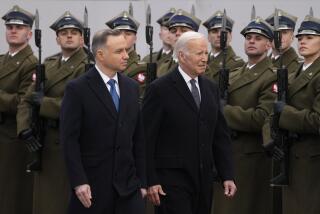Polish Debt Accord Called Boost for Ailing Economy
- Share via
WARSAW — The West’s agreement to reschedule $5 billion of Polish debt appears to be a boost for Poland’s ailing economy, but fundamental problems remain for the Warsaw government, Western economists said Wednesday.
A communique of Tuesday’s accord between Poland and 17 Western creditor countries, published Wednesday by the official Polish news agency PAP, did not give precise details.
“The sides agreed to initial an agreement concerning a major restructuring of Poland’s foreign debt which arose from government-guaranteed loans and credits,” the communique said.
Argentina also has obtained a rescheduling of debt payments it owes to Western creditor governments, Bernardo Grinspun, economics minister, said.
The rescheduling agreement, signed after two days of negotiations with the so-called Paris Club of Sovereign Creditors, will allow Argentina 10 years, including five years’ grace, to repay part of its government-to-government debt.
Grinspun said the accord covers $800 million of interest and principal payments coming due to Argentina’s government creditors in 1985. It also includes $1.3 billion of the country’s arrears as of Dec. 31, 1984.
Economists in Warsaw said the accord appeared likely to give Poland more flexibility in allocating its scarce hard-currency reserve, much of which has been set aside in recent years for repaying the country’s $28-billion debt.
Debt servicing has been a severe strain on Polish industry, forcing cutbacks in imports of the Western components and technology on which Poland became dependent in the 1970s.
The cutbacks have caused a weak performance in exports to the West of engineering and other industrial goods, which in turn has meant less money for debt repayments, economists said.
Trade Surplus
Poland’s 1984 trade surplus with the West was $1.69 billion, up from $1.55 billion in the previous year but not enough to cover all the necessary industrial imports as well as to service debts.
The economists noted that the chief hard-currency earner last year was coal, but the chances for improving coal exports in 1985 in a saturated world market seemed small.
“In these circumstances, the debt accord is a more than welcome breathing space,” one Western embassy analyst said.
Western and Polish economists agreed that a fundamental change in Poland’s prospects could come only when fresh credit is injected into the economy, both for boosting imports and for providing urgently needed modernization in industry.
The accord seems likely to provide one avenue to fresh credit by lifting the final obstacle in the way of Poland securing loans from the International Monetary Fund.
Polish economists said Warsaw might hope for IMF credits of between $1 billion and $2 billion in the first two years of membership.
More to Read
Sign up for Essential California
The most important California stories and recommendations in your inbox every morning.
You may occasionally receive promotional content from the Los Angeles Times.













